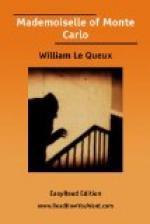“But how long will it be before I can see him again?”
“Ah! That I cannot tell. There is a mystery underlying it all that even I cannot fathom, Miss Ranscomb.”
“What kind of mystery?”
The white cavalier shrugged his shoulders.
“You must ask Mr. Henfrey. Or perhaps his friend Brock knows. Yet if he does, I do not suppose he would disclose anything his friend may have told him in confidence.”
“I am bewildered!” the girl declared. “It is all so very mysterious—Hugh a fugitive from justice! I—I really cannot believe it! What can the mystery be?”
“Of that I have no means of ascertaining, Miss Ranscomb. I am here merely to tell you what has happened and to give you in secret the name and address to which to send a letter to him,” the masked man said very politely. “And now I think we must part. Perhaps if ever we meet again—which is scarcely probable—you will recognize my voice. And always recollect that should you or Mr. Henfrey ever receive a message from ‘Silverado’ it will be from myself.” And he spelt the name.
“Silverado. Yes, I shall not forget you, my mysterious friend.”
“Au revoir!” he said as, bowing gracefully, he turned and left her.
The sun was rising from the sea when Dorise entered her bedroom at the hotel. Her maid had retired, so she undressed herself, and putting on a dressing-gown, she pulled up the blinds and sat down to write a letter to Hugh.
She could not sleep before she had sent him a reassuring message.
In the frenzy of her despair she wrote one letter and addressed it, but having done so she changed her mind. It was not sufficiently reassuring, she decided. It contained an element of doubt. Therefore she tore it up and wrote a second one which she locked safely in her jewel case, and then pulled the blinds and retired.
It was nearly noon next day before she left her room, yet almost as soon as she had descended in the lift the head femme de chambre, a stout Frenchwoman in a frilled cap, entered the room, and walking straight to the waste-paper basket gathered up the contents into her apron and went back along the corridor with an expression of satisfaction upon her full round face.
NINTH CHAPTER
CONCERNS THE SPARROW
With the rosy dawn rising behind them the big dusty car tore along over the white road which led through Pegli and Cornigliano, with their wealth of olives and palms, into the industrial suburbs of old-world Genoa. Then, passing around by the port, the driver turned the car up past Palazzo Doria and along that street of fifteenth-century palaces, the Via Garibaldi, into the little piazza in front of the Annunziata Church.
There he pulled up after a run of two hours from the last of the many railway crossings, most of which they had found closed.




